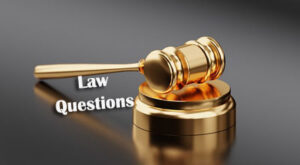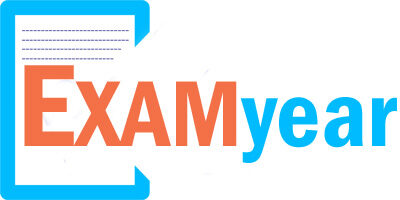Typical Questions on Law – Legal Questions Objective
Interested users can download the Typical Questions on Law from the links enclosed below. Download the Last 5 Years Typical Questions on Law Solved along with the Answers of each question.

This Typical Questions on Law may vary from the Actual paper. Use the Typical Questions on Law as a reference for the exam preparation. Check the Typical Questions on Law from this page.
At the bottom of this page, you will find ‘Click here links’ for downloading the Typical Questions on Law. Click on the required link & download your related Typical Questions on Law to make as a reference for your scheduled preparation.
Law Related Typical Questions Paper
1. Whoever habitually commits offence punishable under Section 8 of the Prevention of Corruption Act, 1988 shall be punishable with imprisonment for a term
(a) Not less than two years but which may extend to seven years and also liable to fine
(b) Not less than three years but which may extend to seven years and also liable to fine
(c) Not less than five years but which may extend to seven years and also liable to fine
(d) None of these
2. Which one is correct?
(a) An Accused is competent witness under the Prevention of Corruption Act,1988.
(b) An Accused is not competent witness under the Prevention of Corruption Act,1988.
(c) An Accused, if he is minor, is competent witness, under the Prevention of Corruption Act,1988.
(d) None of these is correct.
3. Abetment by public servant is an offence defined in Section 9 of the Prevention of Corruption Act, 1988. It shall be
(a) punishable with imprisonment for a term which shall be not less than six months but which may extend to five years and shall also be liable to fine
(b) punishable with imprisonment for a term which shall be not less than one year but which may extend to five years and shall also be liable to fine
(c) punishable with imprisonment for a term which shall be not less than two years but which may extend to five years and shall also be liable to fine
(d) punishable with imprisonment for a term which shall be not less than three years but which may extend to five years and shall also be liable to fine
4. Who among the following is not a public servant?
(a) any Judge, including any person empowered by law to discharge, whether by himself or as a member of any body of persons, any adjudicatory functions
(b) any person authorised by a court of justice to perform any duty, in connection with the administration of justice, including a liquidator, receiver or commissioner appointed by such court
(c) any arbitrator or other person to whom any cause or matter has been referred for decision or report by a court of justice or by a competent public authority
(d) a municipal councilor
5. The word “Public servant” has been defined under section ________ of the Prevention of Corruption Act, 1988
(a) 2(a)
(b) 2(b)
(c) 2(c)
(d) 2(d)
6. Under the Prevention of Corruption Act,1988 the word ‘public duty’ means
(a) A duty in the discharge of which the State has interest
(b) A duty in the discharge of which the public has interest
(c) A duty in which the community at large has interest
(d) All of these
7. Investigation of an offence by the PC Act 1988 shall be done by a police officer not below the rank of
(a) A Deputy Superintendent of Police or an Officer of equivalent rank
(b) In case of Delhi, of an Inspector of Police
(c) In metropolitan areas, of an Assistant Commissioner of Police
(d) All of the above
8. Determination of Quantum of Fine has been provided under________of the Prevention of Corruption Act,1988
(a) Section 16
(b) Section 17
(c) Section 18
(d) None of these
9. Any public servant, who commits criminal misconduct shall be liable to be punished
(a) with imprisonment for a term which shall be not less than one year but which may extend to three years and shall also be liable to fine
(b) with imprisonment for a term which shall be not less than one year but which may extend to five years and shall also be liable to fine
(c) with imprisonment for a term which shall be not less than one year but which may extend to seven years and shall also be liable to fine
(d) none of these
10. How many chapters are there in the Prevention of Corruption Act, 1988?
(a) Four
(b) Five
(c) Six
(d) seven
11. In POCSO Act, 2012 the word ‘child’ means
(a) A child less than sixteen years
(b) A child less than eighteen years
(c) A child of twenty years
(d) A child less than twenty one years
12. Which Court shall be considered as the Special Court?
(a) Chief Judicial Magistrate Court
(b) Session Judge Court
(c) Both (a) and (b)
(d) None of these
13. POCSO Act, 2012 came into force on
(a) 2nd October, 2012
(b) 15t h August, 2012
(c) 26t h January, 2012
(d) 14t h November, 2012
14. The offence ‘aggravated penetrative sexual assault’ has been made punishable under POCSO Act, 2012 for imprisonment
(a) Not less than ten years, which may extend to imprisonment for life, and fine.
(b) Not less than eight years, which may extend to imprisonment for life, and fine.
(c) Not less than seven years, which may extend to imprisonment for life, and fine.
(d) Not less than five years, which may extend to imprisonment for life, and fine
15. If anyone uses a child for pornographic purposes, he shall be punished for
(a) Five years imprisonment and fine and in the event of subsequent conviction, seven years and fine
(b) Six years imprisonment and fine and in the event of subsequent conviction, seven years and fine
(c) Seven years imprisonment and fine and in the event of subsequent conviction, seven years and fine
(d) None of these
16. The meaning of “shared household” under the POCSO Act, 2012 is
(a) the person charged with the offence lives or has lived at any time in a domestic relationship with the child
(b) the owner of the house where child lives
(c) both of the above
(d) none of these
17. “Penetrative sexual assault” has been defined under__________of the POCSO Act,2012
(a) Section 2
(b) Section 3
(c) Section 4
(d) Section 5
18. The media has been barred from disclosing the identity of the child without the permission of the Special Court. This has been provided under
(a) Section 22 of the POCSO Act, 2012
(b) Section 23 of the POCSO Act, 2012
(c) Section 24 of the POCSO Act, 2012
(d) Section 25 of the POCSO Act, 2012
19. Under the POCSO, Act, evidence of the child shall be recorded within a period of __________ of the Special Court taking cognizance.
(a) 20 days
(b) 30 days
(c) 45 days
(d) 60 days
20. Whoever commits sexual assault on a child and makes the child to strip or parade naked in public
(a) shall be punished with imprisonment of either description for a term which shall not be less than five years but which may extend to seven years, and shall also be liable to fine
(b) shall be punished with imprisonment of either description for a term which shall not be less than six years but which may extend to seven years, and shall also be liable to fine
(c) shall be punished with imprisonment of either description for a term which shall not be less than ten years but which may extend to seven years, and shall also be liable to fine
(d) none of these
21. Under the POSCO Act the Special Court shall complete the trial, as far as possible, within a period of __________ from the date of taking cognizance of the offence.
(a) Six months
(b) One year
(c) Two years
(d) Three years
22. Right of child to take assistance of legal practitioner has been provided under ___________ of the POCSO Act, 2012.
(a) Section 39
(b) Section 40
(c) Section 41
(d) Section 41
23. Who has power to make rules for carrying out the purposes of POCSO Act?
(a) High Court
(b) Supreme Court
(c) State Government
(d) Central Government
24. A teacher is aware that one of his students has been sexually abused by a staff of the school but he did not report to the authorities. The teacher shall
(a) have no liability
(b) be punished with three months imprisonment or with fine or both
(c) be punished with six months imprisonment or with fine or both
(d) none of these is correct
25. If any person provides false information with intention to defame other person including child, he shall
(a) be punished with three months imprisonment or with fine or both
(b) be punished with six months imprisonment or with fine or both
(c) be punished with one year imprisonment or with fine or both
(d) none of these
More Question Set on Law MCQs from Various Exam
| Model Question | Old Question |
| Sample Papers | Mock Test |
| Practice Set | Question Bank |
| Important Questions | Test Papers |
| Typical Questions | Selected Questions |
26. Indian Evidence Act came into force on
(a) 1st August,1872
(b) 1st September 1872
(c) 1st April 1872
(d) 1st March, 1872
27. Law of evidence is
(a) a substantive law
(b) a procedural law
(c) both (a) & (b)
(d) neither (a) nor (b)
28. “Facts in issue” as used in the Indian Evidence Act means and includes
(a) facts, the existence, non-existence, of which is admitted by the parties
(b) facts, the existence, non-existence, of which is disputed by the parties
(c) both of the above
(d) none of these
29. Tape recorded conversation is relevant with certain precautions was laid down in case of
(a) R. M Malkani vs State of Maharashtra
(b) Dr.Prafulla Bala Desai vs State of Maharashtra
(c) Bhuboni sahu vs Emperor
(d) None of these
30. Standard of proof in criminal cases is
(a) Preponderance of probability
(b) Beyond reasonable doubt
(c) Up to the satisfaction of the Court
(d) None of these
31. Indian Evidence Act is not applicable in
(a) Civil proceedings
(b) Criminal Proceedings
(c) Proceeding before an Arbitrator
(d) All of these
32. Motive, preparation and previous or subsequent conduct are the relevant facts. This has been provided under ________of the Indian Evidence Act.
(a) Section 7
(b) Section 8
(c) Section 9
(d) Section 10
33. Facts which are the occasion, cause, or effect, immediately or otherwise of relevant facts are relevant. This provision has been mentioned under_________of the Indian Evidence Act.
(a) Section 7
(b) Section 8
(c) Section 9
(d) Section 10
34. The “plea of alibi” is relevant in _________of the Indian Evidence Act
(a) Section 9
(b) Section 10
(c) Section 11
(d) Section 12
35. Who can make Admission in a suit or proceeding under the Indian Evidence Act?
(a) Party to the proceeding
(b) Party interested in subject-matter
(c) Person from whom interest derived
(d) All of these
36. Confession made to police officer is _____under the Indian Evidence Act.
(a) Relevant
(b) not relevant
(c) always relevant
(d) none of these
37. Confession made by one accused can be relevant against other accused if
(a) there is joint trial of both accused for same offence
(b) confession made by one accused affecting the other accused
(c) both (a) & (b) should be present together
(d) none of these
38. Provision of dying declaration has been mentioned under ______of the Indian Evidence Act.
(a) Section 32(1)
(b) Section 33(1)
(c) Section 34(1)
(d) Section 35(1)
39. Which of the following types of evidence means ‘testimony’?
(a) Direct evidence
(b) Circumstantial evidence
(c) Both (a) and (b)
(d) None of these
40. The res inter alia acta is receivable under__________of the Indian Evidence Act
(a) Section 45
(b) Section 46
(c) Section 47
(d) Section 48
41. The evidence of bad character is irrelevant unless
(a) it is in response of good character
(b) character himself is under dispute
(c) both of the above
(d) none of these
42. The circumstances under which the Secondary evidence is admissible
(a) Section 63 of the Indian Evidence Act
(b) Section 64 of the Indian Evidence Act
(c) Section 65 of the Indian Evidence Act
(d) None of these
43. If it is proved that sexual intercourse has been committed against a woman and she says her consent was absent. Then the court shall presume that her consent was absent . The burden of proof in this case shall lie on the accused to prove that her consent was present. This provision was laid down by
(a) Criminal Law (Amendment) Act, 1981
(b) Criminal Law (Amendment) Act, 1982
(c) Criminal Law (Amendment) Act,1983
(d) None of these
44. In order to hold a person bound by estoppel the following requirement(s) must be fulfilled.
(a) there must be representation that certain state of things is true
(b) the person to whom representation is made should have belief of it
(c) person to whom representation is made should have belief of it and altered his position
(d) all of these
45. Things said or done by a conspirator in reference to common design, is a relevant fact under ______________ of the Indian Evidence Act.
(a) Section 13
(b) Section 12
(c) Section 11
(d) Section 10
46. Which section of the Indian Evidence Act provides about hostile witness?
(a) Section 134
(b) Section 148
(c) Section 154
(d) Section 155
47. In which of the following case Supreme Court held that “Test of identification parade is only an aid to investigation the practice is not born out of prudence”?
(a) Siddharth Vashist@ Manu Sharma v State
(b) Shivaji v Nagendra
(c) S. Jaiswal v Alok
(d) Sujata v S K Behra
48. If a dumb witness gives witness in writing that is known as
(a) oral evidence
(b) documentary evidence
(c) circumstantial evidence
(d) none of these
49. The presumption as to legitimacy of any child born during the continuance of a valid marriage between his mother and any man is________ unless non-access is proved by such man.
(a) rebuttable presumption
(b) conclusive proof
(c) mixed presumption
(d) none of these
50. Which among the following is not correct?
Leading questions must not be asked
(a) If objected to by the adverse party
(b) In an examination-in-chief
(c) In a re-examination
(d) In cross examination

